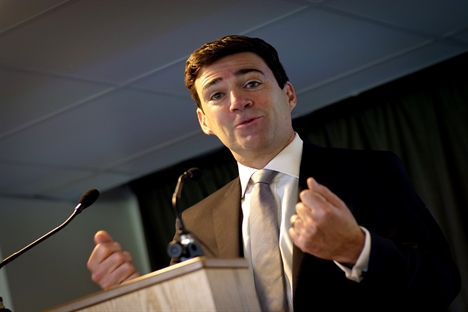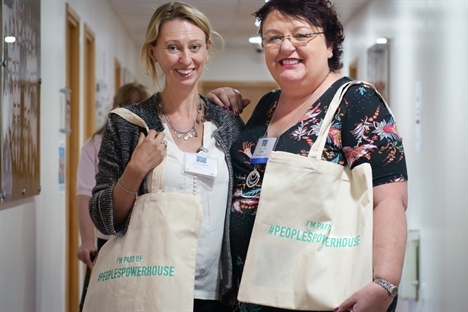16.08.17
Open the doors of this Powerhouse and let the people in
Source: PSE Aug/Sep 17
PSE’s Luana Salles reports from the first-ever People’s Powerhouse, a northern conference shaped around the values of inclusion, diversity and hope.
This year’s Northern Powerhouse Conference, the second instalment of an event dedicated to discussing the north’s industry and economy, suffered a backlash of criticism. After unveiling a largely ‘male and pale’ line-up of speakers, officials across local government raised an uproar: Wigan Council CEO Donna Hall told PSE women were “sick, tired and fed up” of male-dominated events; Greater Manchester (GM) mayor Andy Burnham called the situation embarrassing; and Julie Ward MEP argued it was wholly concerning that the organisers didn’t “understand why women must be involved at every level”.
But one local government leader went even further. Jo Miller, chief executive of Doncaster Council and the current president of Solace, decided that beyond just boycotting the conference, she and her colleagues would set up their own separate event – and thus, the People’s Powerhouse was born.
Hosted on 12 July at the Keepmoat Stadium, the event brought together a diverse range of speakers from across the north to focus on key elements of inclusive growth. Its line-up was representative of every layer of the public sphere: from young Charlie Lisle, who spoke about working with GM Talent Match, right up to political heavyweights like Burnham, Lord Adebowale and Dame Louise Casey. There was no shortage of women, either: one participant, Peter Holbrook of Social Enterprise UK, even joked that it was the first time he’d been a “token bloke” in an all-female panel.
To counteract what Miller and Hall believe is a relentless focus on ‘macho themes’ –conferences centred around transport, property, tower blocks and railways, with lots of private money to prop it all up – the People’s Powerhouse promised to focus on communities.
“This conference is about the future – and the future is often decided by the things we don’t talk about,” said Lord Adebowale, CEO of Turning Point. “It’s decided by the undiscussable. The things we worry about, the things we live in fear of raising, and the things that haven’t been talked about are the things that we must talk about today: people.
“The future is not going to be about enhancing short-term shareholder value; the future is going to be about delivering benefits for the community, benefits for the environment and delivering profit. In short, it’s social enterprises.”
To shape a Northern Powerhouse that focuses on its people, Lord Adebowale urged local government and the third and private sectors to mature the crucial skill of collaboration. “How do we work together as teams? How do we build the kind of leadership that creates value and innovation by collaborating across organisations and structural boundaries? That’s what we need to do in the north,” he emphasised.
“This is not just about making plans. It’s about understanding the preconditions for collaboration – this connection between civic institutions and communities. As anybody who watched the dreadful [Grenfell Tower fire] episode in Kensington knows, that was not just a tragic episode. It was a tragic episode that underlined the systemic failure which created, and continues to create, the disconnection between people and their civic institutions and communities.”
In his keynote, Burnham, the recently elected GM mayor, said his 16 years in government have led him to much the same conclusion. “By definition, Westminster is remote from people. It has always distrusted the local: taking funding out of local government, taking power out of local government, never trusting it with the job of improving its community,” he admitted.

But the arrival of devolution offers the best chance of forging a new way of doing politics, Burnham argued; one which could step away from the “old thinking, old voices and the old men in suits” by being mindful of its people.
Moving beyond words
To do this, the mayor proposed that any organisation working with the public should start with a balanced representation of communities, with decisions shaped by both men and women. He has already been implementing that in GM, where each of the 10 boroughs now need to have equal representation in every combined authority meeting. While there is work to be done beyond that, “that is the right starting point”.
“That brings me to my second principle,” he told the audience. “Open the doors of this Powerhouse and let the people in. Don’t build the Powerhouse for politicians to sit in and pontificate; open the doors to the public. Bring in the voices that aren’t heard equally in society.
“And once you’ve let people in, give them a real job to do. Don’t, under any circumstance, pay lip service to them or create token boards that you just basically marginalise and then forget about. If we’re talking about a People’s Powerhouse, the answer has to be in the first word, not the second.”
Miller, labelled the “heroine of the day” for setting up the successful event, agreed with Burnham. “Fundamentally, if we change the conversation, if we change the actors in the conversation, we get better decisions and better delivery,” she said.
“We have a clear moral purpose: making sure our place and our people thrive. So, go out of the room today thinking of your role; thinking, ‘what am I going to do differently?’. Small changes that we make can get us to where we need to be.”

The northern family
As well as featuring keynote speeches, the People’s Powerhouse brought together organisations to debate about how to create a north that works for everyone. During a panel discussion, Francesca Hegyi, executive director at UK City of Culture Hull 2017, revealed what her team had done to attract tourism and improve leisure services for residents; Holbrook of Social Enterprise UK outlined the opportunity the Social Value Act and better procurement processes create to transform social mobility; and Ed Cox of IPPR North called for the creation of a Northern Assembly.
The day was also peppered with a range of activity sessions, most refreshingly interactive and open-ended. These focused on a variety of topics centred on inclusive growth, such as education and employment, civic leadership, devolution, rail and infrastructure, health and wellbeing, housing and gender diversity.
By the end of the day – which was closed off by Dame Louise in her final speech as a civil servant after an 18-year run – every single person in attendance could only comment on one thing: how different the conference had been from all others.
The environment felt more intimate, like a big family in conversation; the debates were more welcoming and participative; and the underlying sentiment running across all sessions was one of intense hope.
“We are in an era in which the north can create a future not just for itself, but for the country,” said Lord Adebowale. “We need to be that ambitious. The people of the north have the potential to be their own revolution – the people’s revolution.
“The new economy that will lead the way for Britain. The Northern People’s Powerhouse can be Britain’s north star.”
Image: © People's Powerhouse
FOR MORE INFORMATION
Tw: @PeoplesPowerhse
W: www.peoplespowerhouse.org.uk